ISLAM 2: Investigating the Reasons for the Beginning of Hadith
VerifiedAdded on 2020/03/07
|6
|1498
|864
Essay
AI Summary
This essay delves into the historical and religious factors that led to the emergence of Hadith. It examines the context surrounding the Prophet Muhammad's life and the subsequent need to document his teachings and actions, as well as the practices of his companions, the Sahaba. The essay explores the relationship between Hadith, the Quran, and Sunnah, highlighting how Hadith served to clarify and elaborate on the Quran's directives and provide guidance for the growing Muslim community. It discusses the role of Hadith in Islamic law, the spread of Islam, and the importance of preserving the Prophet's legacy, ultimately concluding that Hadith arose to meet the practical and spiritual needs of the early Islamic community, ensuring the preservation and transmission of Islamic knowledge and practices for future generations. The essay also considers the historical context, including the limited literacy of the time and the need to address challenges faced by the expanding Muslim dominion.
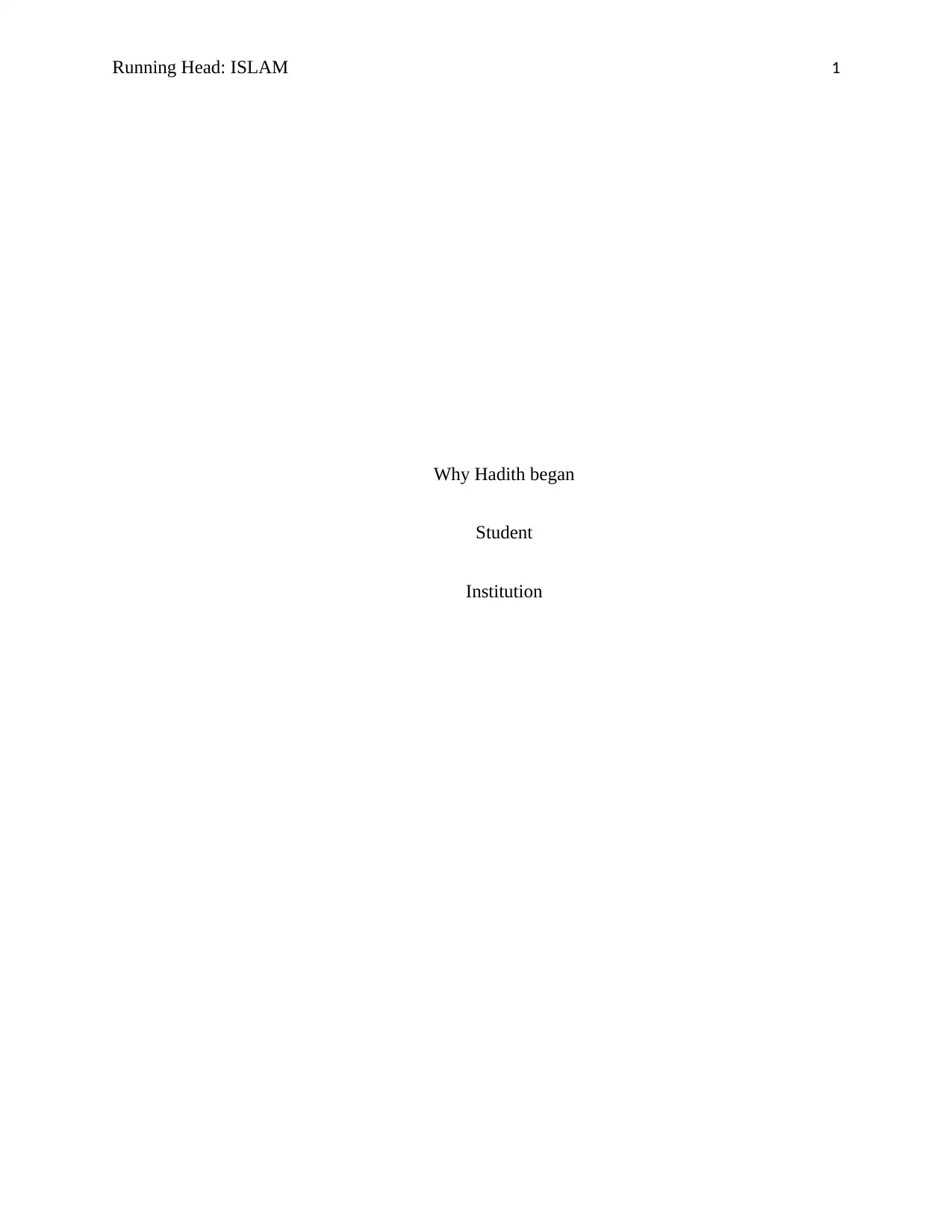
Running Head: ISLAM 1
Why Hadith began
Student
Institution
Why Hadith began
Student
Institution
Paraphrase This Document
Need a fresh take? Get an instant paraphrase of this document with our AI Paraphraser
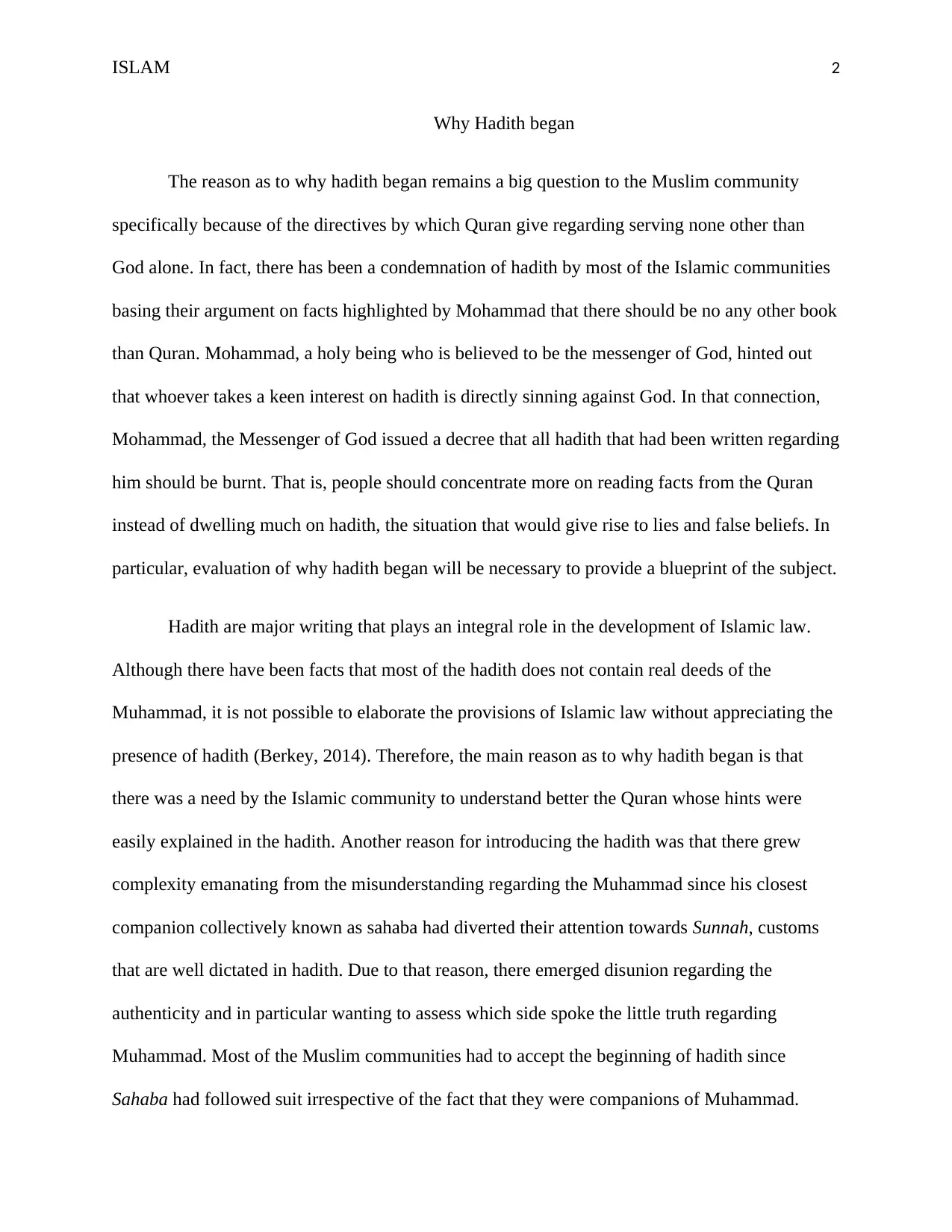
ISLAM 2
Why Hadith began
The reason as to why hadith began remains a big question to the Muslim community
specifically because of the directives by which Quran give regarding serving none other than
God alone. In fact, there has been a condemnation of hadith by most of the Islamic communities
basing their argument on facts highlighted by Mohammad that there should be no any other book
than Quran. Mohammad, a holy being who is believed to be the messenger of God, hinted out
that whoever takes a keen interest on hadith is directly sinning against God. In that connection,
Mohammad, the Messenger of God issued a decree that all hadith that had been written regarding
him should be burnt. That is, people should concentrate more on reading facts from the Quran
instead of dwelling much on hadith, the situation that would give rise to lies and false beliefs. In
particular, evaluation of why hadith began will be necessary to provide a blueprint of the subject.
Hadith are major writing that plays an integral role in the development of Islamic law.
Although there have been facts that most of the hadith does not contain real deeds of the
Muhammad, it is not possible to elaborate the provisions of Islamic law without appreciating the
presence of hadith (Berkey, 2014). Therefore, the main reason as to why hadith began is that
there was a need by the Islamic community to understand better the Quran whose hints were
easily explained in the hadith. Another reason for introducing the hadith was that there grew
complexity emanating from the misunderstanding regarding the Muhammad since his closest
companion collectively known as sahaba had diverted their attention towards Sunnah, customs
that are well dictated in hadith. Due to that reason, there emerged disunion regarding the
authenticity and in particular wanting to assess which side spoke the little truth regarding
Muhammad. Most of the Muslim communities had to accept the beginning of hadith since
Sahaba had followed suit irrespective of the fact that they were companions of Muhammad.
Why Hadith began
The reason as to why hadith began remains a big question to the Muslim community
specifically because of the directives by which Quran give regarding serving none other than
God alone. In fact, there has been a condemnation of hadith by most of the Islamic communities
basing their argument on facts highlighted by Mohammad that there should be no any other book
than Quran. Mohammad, a holy being who is believed to be the messenger of God, hinted out
that whoever takes a keen interest on hadith is directly sinning against God. In that connection,
Mohammad, the Messenger of God issued a decree that all hadith that had been written regarding
him should be burnt. That is, people should concentrate more on reading facts from the Quran
instead of dwelling much on hadith, the situation that would give rise to lies and false beliefs. In
particular, evaluation of why hadith began will be necessary to provide a blueprint of the subject.
Hadith are major writing that plays an integral role in the development of Islamic law.
Although there have been facts that most of the hadith does not contain real deeds of the
Muhammad, it is not possible to elaborate the provisions of Islamic law without appreciating the
presence of hadith (Berkey, 2014). Therefore, the main reason as to why hadith began is that
there was a need by the Islamic community to understand better the Quran whose hints were
easily explained in the hadith. Another reason for introducing the hadith was that there grew
complexity emanating from the misunderstanding regarding the Muhammad since his closest
companion collectively known as sahaba had diverted their attention towards Sunnah, customs
that are well dictated in hadith. Due to that reason, there emerged disunion regarding the
authenticity and in particular wanting to assess which side spoke the little truth regarding
Muhammad. Most of the Muslim communities had to accept the beginning of hadith since
Sahaba had followed suit irrespective of the fact that they were companions of Muhammad.
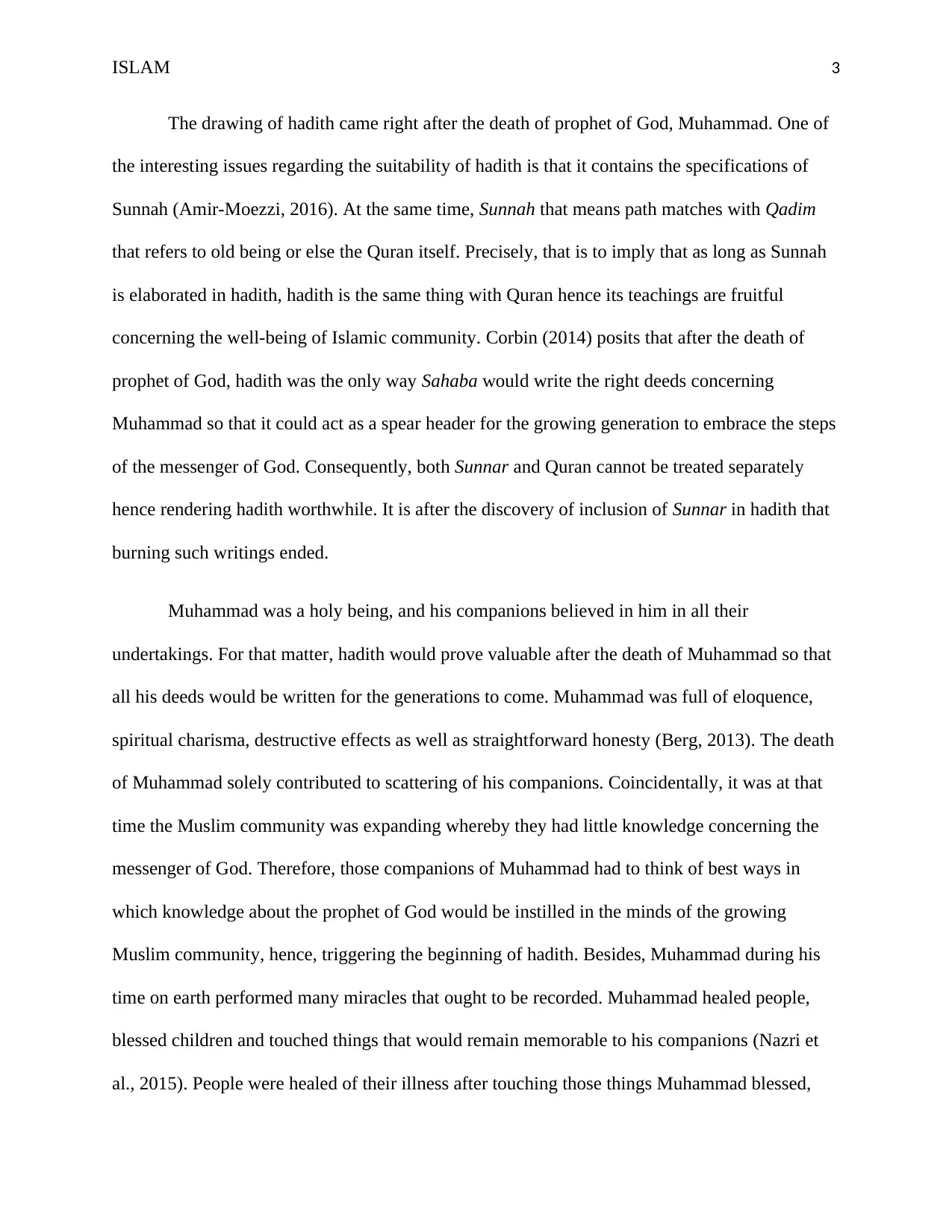
ISLAM 3
The drawing of hadith came right after the death of prophet of God, Muhammad. One of
the interesting issues regarding the suitability of hadith is that it contains the specifications of
Sunnah (Amir-Moezzi, 2016). At the same time, Sunnah that means path matches with Qadim
that refers to old being or else the Quran itself. Precisely, that is to imply that as long as Sunnah
is elaborated in hadith, hadith is the same thing with Quran hence its teachings are fruitful
concerning the well-being of Islamic community. Corbin (2014) posits that after the death of
prophet of God, hadith was the only way Sahaba would write the right deeds concerning
Muhammad so that it could act as a spear header for the growing generation to embrace the steps
of the messenger of God. Consequently, both Sunnar and Quran cannot be treated separately
hence rendering hadith worthwhile. It is after the discovery of inclusion of Sunnar in hadith that
burning such writings ended.
Muhammad was a holy being, and his companions believed in him in all their
undertakings. For that matter, hadith would prove valuable after the death of Muhammad so that
all his deeds would be written for the generations to come. Muhammad was full of eloquence,
spiritual charisma, destructive effects as well as straightforward honesty (Berg, 2013). The death
of Muhammad solely contributed to scattering of his companions. Coincidentally, it was at that
time the Muslim community was expanding whereby they had little knowledge concerning the
messenger of God. Therefore, those companions of Muhammad had to think of best ways in
which knowledge about the prophet of God would be instilled in the minds of the growing
Muslim community, hence, triggering the beginning of hadith. Besides, Muhammad during his
time on earth performed many miracles that ought to be recorded. Muhammad healed people,
blessed children and touched things that would remain memorable to his companions (Nazri et
al., 2015). People were healed of their illness after touching those things Muhammad blessed,
The drawing of hadith came right after the death of prophet of God, Muhammad. One of
the interesting issues regarding the suitability of hadith is that it contains the specifications of
Sunnah (Amir-Moezzi, 2016). At the same time, Sunnah that means path matches with Qadim
that refers to old being or else the Quran itself. Precisely, that is to imply that as long as Sunnah
is elaborated in hadith, hadith is the same thing with Quran hence its teachings are fruitful
concerning the well-being of Islamic community. Corbin (2014) posits that after the death of
prophet of God, hadith was the only way Sahaba would write the right deeds concerning
Muhammad so that it could act as a spear header for the growing generation to embrace the steps
of the messenger of God. Consequently, both Sunnar and Quran cannot be treated separately
hence rendering hadith worthwhile. It is after the discovery of inclusion of Sunnar in hadith that
burning such writings ended.
Muhammad was a holy being, and his companions believed in him in all their
undertakings. For that matter, hadith would prove valuable after the death of Muhammad so that
all his deeds would be written for the generations to come. Muhammad was full of eloquence,
spiritual charisma, destructive effects as well as straightforward honesty (Berg, 2013). The death
of Muhammad solely contributed to scattering of his companions. Coincidentally, it was at that
time the Muslim community was expanding whereby they had little knowledge concerning the
messenger of God. Therefore, those companions of Muhammad had to think of best ways in
which knowledge about the prophet of God would be instilled in the minds of the growing
Muslim community, hence, triggering the beginning of hadith. Besides, Muhammad during his
time on earth performed many miracles that ought to be recorded. Muhammad healed people,
blessed children and touched things that would remain memorable to his companions (Nazri et
al., 2015). People were healed of their illness after touching those things Muhammad blessed,
⊘ This is a preview!⊘
Do you want full access?
Subscribe today to unlock all pages.

Trusted by 1+ million students worldwide
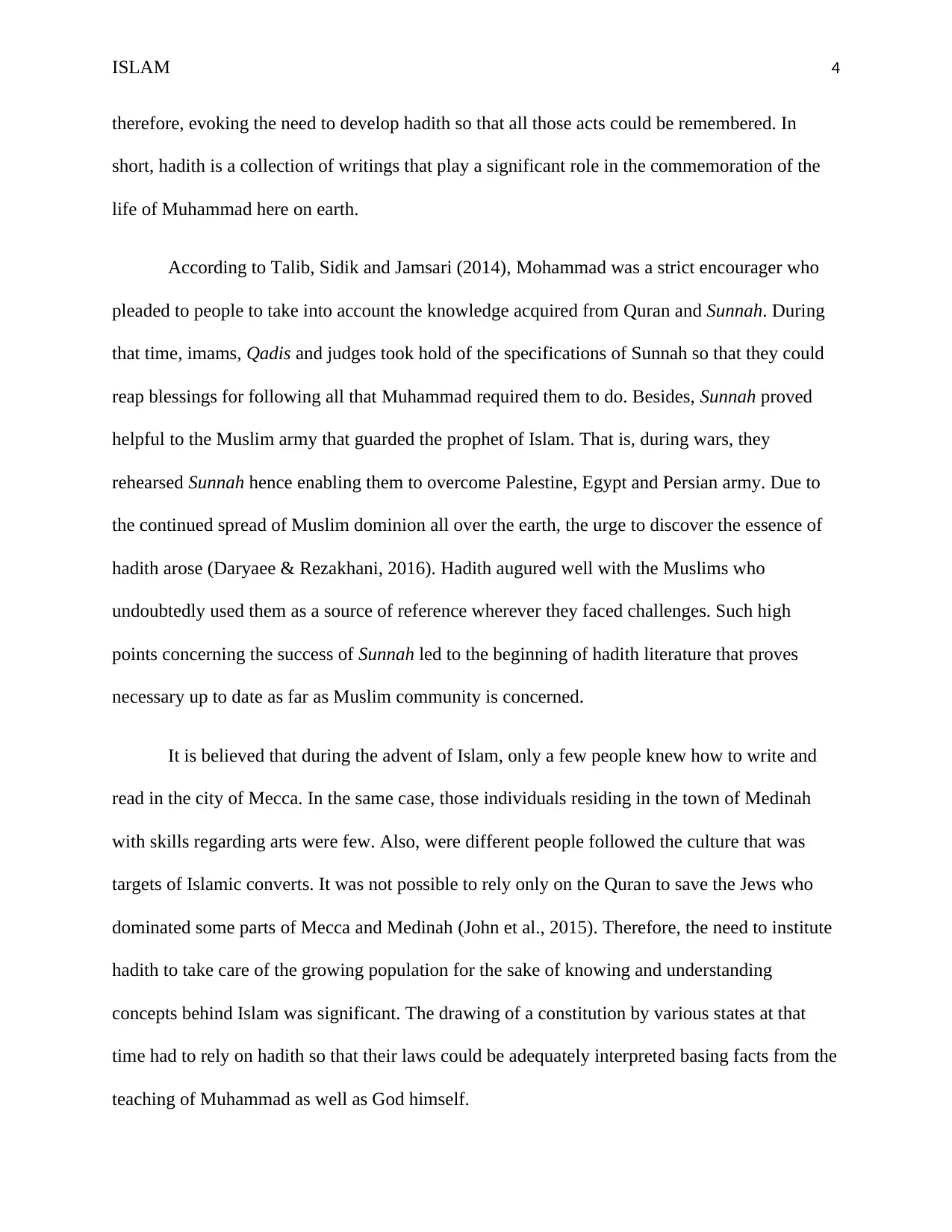
ISLAM 4
therefore, evoking the need to develop hadith so that all those acts could be remembered. In
short, hadith is a collection of writings that play a significant role in the commemoration of the
life of Muhammad here on earth.
According to Talib, Sidik and Jamsari (2014), Mohammad was a strict encourager who
pleaded to people to take into account the knowledge acquired from Quran and Sunnah. During
that time, imams, Qadis and judges took hold of the specifications of Sunnah so that they could
reap blessings for following all that Muhammad required them to do. Besides, Sunnah proved
helpful to the Muslim army that guarded the prophet of Islam. That is, during wars, they
rehearsed Sunnah hence enabling them to overcome Palestine, Egypt and Persian army. Due to
the continued spread of Muslim dominion all over the earth, the urge to discover the essence of
hadith arose (Daryaee & Rezakhani, 2016). Hadith augured well with the Muslims who
undoubtedly used them as a source of reference wherever they faced challenges. Such high
points concerning the success of Sunnah led to the beginning of hadith literature that proves
necessary up to date as far as Muslim community is concerned.
It is believed that during the advent of Islam, only a few people knew how to write and
read in the city of Mecca. In the same case, those individuals residing in the town of Medinah
with skills regarding arts were few. Also, were different people followed the culture that was
targets of Islamic converts. It was not possible to rely only on the Quran to save the Jews who
dominated some parts of Mecca and Medinah (John et al., 2015). Therefore, the need to institute
hadith to take care of the growing population for the sake of knowing and understanding
concepts behind Islam was significant. The drawing of a constitution by various states at that
time had to rely on hadith so that their laws could be adequately interpreted basing facts from the
teaching of Muhammad as well as God himself.
therefore, evoking the need to develop hadith so that all those acts could be remembered. In
short, hadith is a collection of writings that play a significant role in the commemoration of the
life of Muhammad here on earth.
According to Talib, Sidik and Jamsari (2014), Mohammad was a strict encourager who
pleaded to people to take into account the knowledge acquired from Quran and Sunnah. During
that time, imams, Qadis and judges took hold of the specifications of Sunnah so that they could
reap blessings for following all that Muhammad required them to do. Besides, Sunnah proved
helpful to the Muslim army that guarded the prophet of Islam. That is, during wars, they
rehearsed Sunnah hence enabling them to overcome Palestine, Egypt and Persian army. Due to
the continued spread of Muslim dominion all over the earth, the urge to discover the essence of
hadith arose (Daryaee & Rezakhani, 2016). Hadith augured well with the Muslims who
undoubtedly used them as a source of reference wherever they faced challenges. Such high
points concerning the success of Sunnah led to the beginning of hadith literature that proves
necessary up to date as far as Muslim community is concerned.
It is believed that during the advent of Islam, only a few people knew how to write and
read in the city of Mecca. In the same case, those individuals residing in the town of Medinah
with skills regarding arts were few. Also, were different people followed the culture that was
targets of Islamic converts. It was not possible to rely only on the Quran to save the Jews who
dominated some parts of Mecca and Medinah (John et al., 2015). Therefore, the need to institute
hadith to take care of the growing population for the sake of knowing and understanding
concepts behind Islam was significant. The drawing of a constitution by various states at that
time had to rely on hadith so that their laws could be adequately interpreted basing facts from the
teaching of Muhammad as well as God himself.
Paraphrase This Document
Need a fresh take? Get an instant paraphrase of this document with our AI Paraphraser
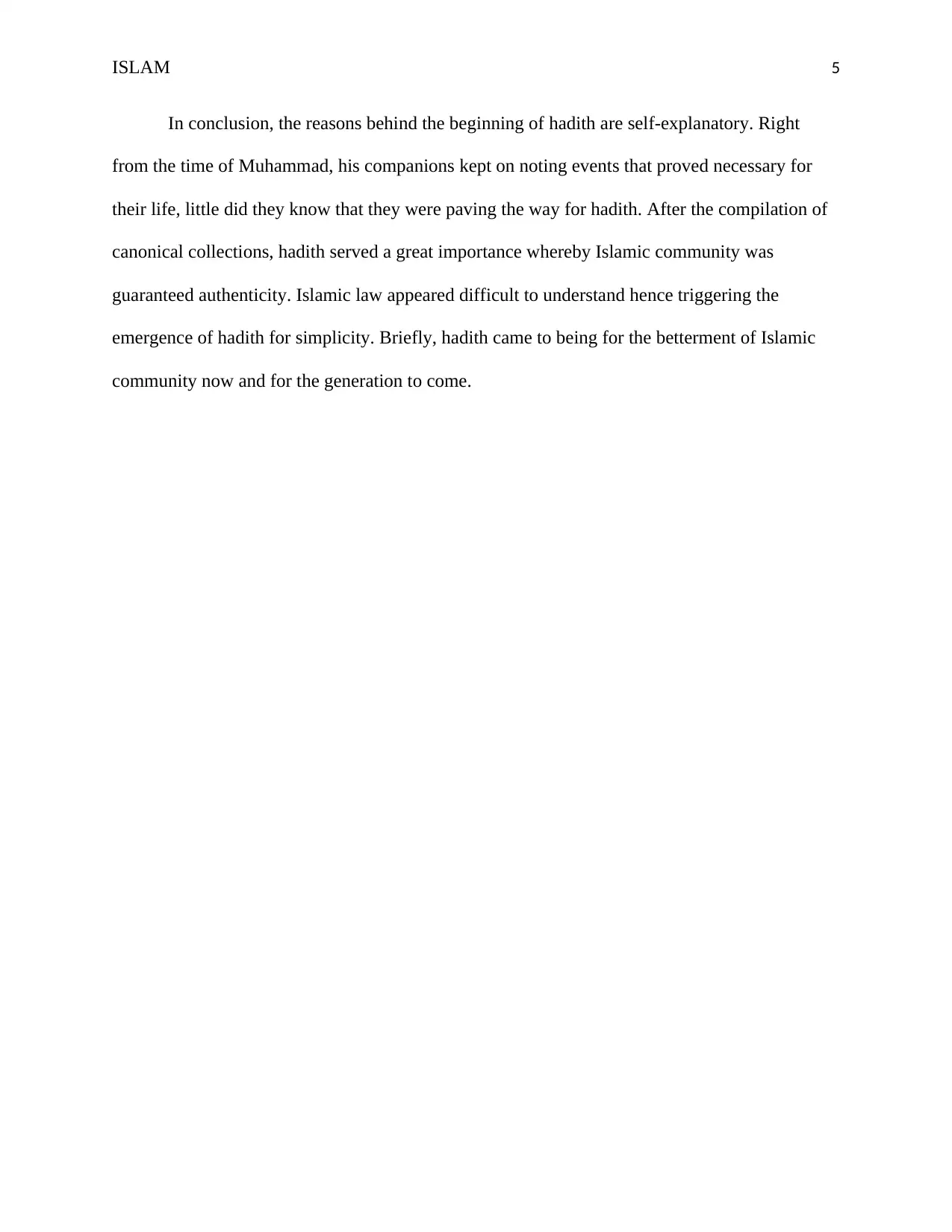
ISLAM 5
In conclusion, the reasons behind the beginning of hadith are self-explanatory. Right
from the time of Muhammad, his companions kept on noting events that proved necessary for
their life, little did they know that they were paving the way for hadith. After the compilation of
canonical collections, hadith served a great importance whereby Islamic community was
guaranteed authenticity. Islamic law appeared difficult to understand hence triggering the
emergence of hadith for simplicity. Briefly, hadith came to being for the betterment of Islamic
community now and for the generation to come.
In conclusion, the reasons behind the beginning of hadith are self-explanatory. Right
from the time of Muhammad, his companions kept on noting events that proved necessary for
their life, little did they know that they were paving the way for hadith. After the compilation of
canonical collections, hadith served a great importance whereby Islamic community was
guaranteed authenticity. Islamic law appeared difficult to understand hence triggering the
emergence of hadith for simplicity. Briefly, hadith came to being for the betterment of Islamic
community now and for the generation to come.
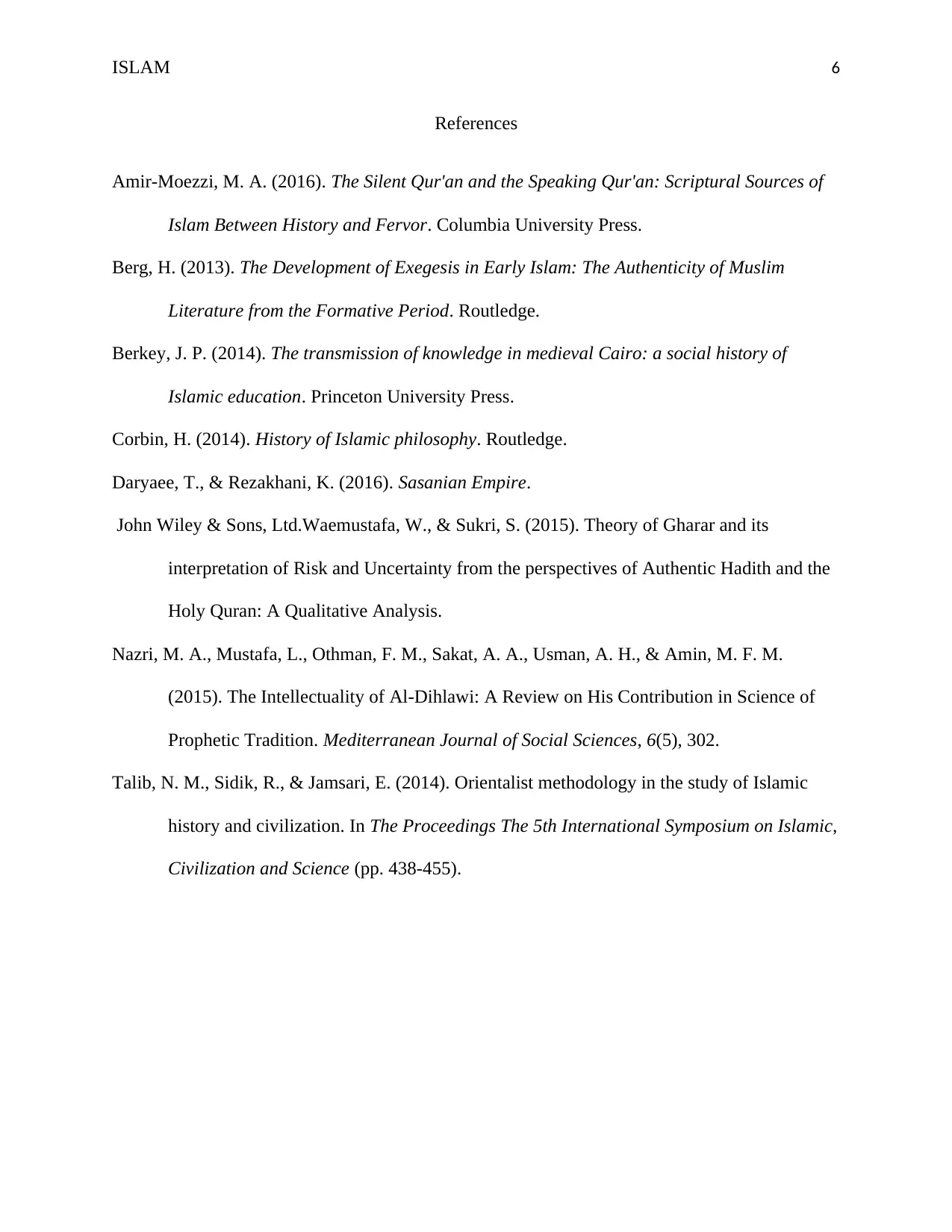
ISLAM 6
References
Amir-Moezzi, M. A. (2016). The Silent Qur'an and the Speaking Qur'an: Scriptural Sources of
Islam Between History and Fervor. Columbia University Press.
Berg, H. (2013). The Development of Exegesis in Early Islam: The Authenticity of Muslim
Literature from the Formative Period. Routledge.
Berkey, J. P. (2014). The transmission of knowledge in medieval Cairo: a social history of
Islamic education. Princeton University Press.
Corbin, H. (2014). History of Islamic philosophy. Routledge.
Daryaee, T., & Rezakhani, K. (2016). Sasanian Empire.
John Wiley & Sons, Ltd.Waemustafa, W., & Sukri, S. (2015). Theory of Gharar and its
interpretation of Risk and Uncertainty from the perspectives of Authentic Hadith and the
Holy Quran: A Qualitative Analysis.
Nazri, M. A., Mustafa, L., Othman, F. M., Sakat, A. A., Usman, A. H., & Amin, M. F. M.
(2015). The Intellectuality of Al-Dihlawi: A Review on His Contribution in Science of
Prophetic Tradition. Mediterranean Journal of Social Sciences, 6(5), 302.
Talib, N. M., Sidik, R., & Jamsari, E. (2014). Orientalist methodology in the study of Islamic
history and civilization. In The Proceedings The 5th International Symposium on Islamic,
Civilization and Science (pp. 438-455).
References
Amir-Moezzi, M. A. (2016). The Silent Qur'an and the Speaking Qur'an: Scriptural Sources of
Islam Between History and Fervor. Columbia University Press.
Berg, H. (2013). The Development of Exegesis in Early Islam: The Authenticity of Muslim
Literature from the Formative Period. Routledge.
Berkey, J. P. (2014). The transmission of knowledge in medieval Cairo: a social history of
Islamic education. Princeton University Press.
Corbin, H. (2014). History of Islamic philosophy. Routledge.
Daryaee, T., & Rezakhani, K. (2016). Sasanian Empire.
John Wiley & Sons, Ltd.Waemustafa, W., & Sukri, S. (2015). Theory of Gharar and its
interpretation of Risk and Uncertainty from the perspectives of Authentic Hadith and the
Holy Quran: A Qualitative Analysis.
Nazri, M. A., Mustafa, L., Othman, F. M., Sakat, A. A., Usman, A. H., & Amin, M. F. M.
(2015). The Intellectuality of Al-Dihlawi: A Review on His Contribution in Science of
Prophetic Tradition. Mediterranean Journal of Social Sciences, 6(5), 302.
Talib, N. M., Sidik, R., & Jamsari, E. (2014). Orientalist methodology in the study of Islamic
history and civilization. In The Proceedings The 5th International Symposium on Islamic,
Civilization and Science (pp. 438-455).
⊘ This is a preview!⊘
Do you want full access?
Subscribe today to unlock all pages.

Trusted by 1+ million students worldwide
1 out of 6
Related Documents
Your All-in-One AI-Powered Toolkit for Academic Success.
+13062052269
info@desklib.com
Available 24*7 on WhatsApp / Email
![[object Object]](/_next/static/media/star-bottom.7253800d.svg)
Unlock your academic potential
Copyright © 2020–2026 A2Z Services. All Rights Reserved. Developed and managed by ZUCOL.



